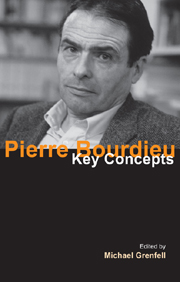Book contents
- Frontmatter
- Contents
- Contributors
- Acknowledgements
- Introduction
- PART I BIOGRAPHY, THEORY AND PRACTICE
- PART II FIELD THEORY: BEYOND SUBJECTIVITY AND OBJECTIVITY
- PART III FIELD MECHANISMS
- 5 Social class
- 6 Capital
- 7 Doxa
- 8 Hysteresis
- PART IV FIELD CONDITIONS
- Conclusion
- Postscript: methodological principles
- Chronology
- Bibliography
- Index
5 - Social class
from PART III - FIELD MECHANISMS
- Frontmatter
- Contents
- Contributors
- Acknowledgements
- Introduction
- PART I BIOGRAPHY, THEORY AND PRACTICE
- PART II FIELD THEORY: BEYOND SUBJECTIVITY AND OBJECTIVITY
- PART III FIELD MECHANISMS
- 5 Social class
- 6 Capital
- 7 Doxa
- 8 Hysteresis
- PART IV FIELD CONDITIONS
- Conclusion
- Postscript: methodological principles
- Chronology
- Bibliography
- Index
Summary
Introduction
Bourdieu is distinctive among his contemporaries in having maintained a balance in the focus of his work between culture and lifestyle on one side, and social class on the other. His analysis of cultural life maintains a strong focus upon class, prioritizing it in a way that is unusual today. And, he further distinguishes himself from much cultural analysis by using large quantitative (survey) data sets in this context. Equally, however, his cultural focus distinguishes him from most other class analysts. He resists the tendency in much class analysis, criticized by Savage (2000), of retreating from the territory of mainstream social science and ignoring culture and lifestyle in order to focus upon relatively narrow and technical issues. Bourdieu maintains a role for social class within the context of a mainstream and culturally focused sociology. However, there are very few places in his work where he discusses the concept of class directly. He never engages in any detail with other key contemporary theorists of social class (for example, John Goldthorpe or E. Wright) and he does not offer a typology of classes to compete with others on the academic market. His “theory” of social class, if it is appropriate to say that he has one, remains implicit for much of the time (although see Bourdieu 1985d; 1987; 1992f;1 1998c: 10–13). My aim in this chapter is to make it explicit and explain why it precludes the formulation of a clear class typology.
- Type
- Chapter
- Information
- Pierre BourdieuKey Concepts, pp. 87 - 100Publisher: Acumen PublishingPrint publication year: 2008
- 35
- Cited by

